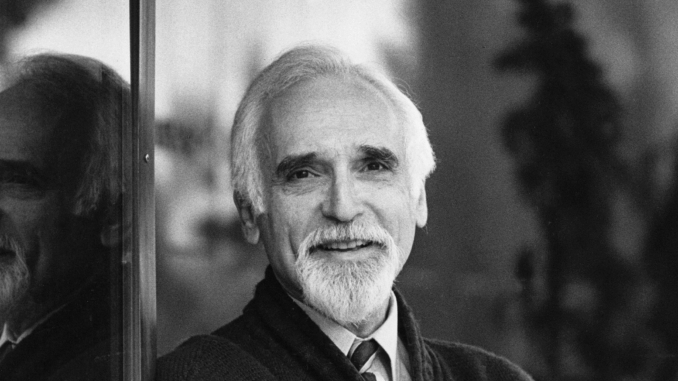
Harold Gould was already a respected character actor by the time he appeared as Miles Webber—Rose Nylund’s charming love interest—on the beloved sitcom The Golden Girls. But many may not realize that his career extended well beyond that golden-hued chapter. With a distinctive blend of sophistication, warmth, and impeccable comedic timing, Gould’s post-Golden Girls journey through television, film, and stage continued to showcase his mastery of the craft. This article dives into the versatile and accomplished path Harold Gould followed after leaving his mark on one of television’s most iconic sitcoms.
Contents
Harold Gould’s Evolution Beyond The Golden Girls

When The Golden Girls concluded its run in 1992, Harold Gould was already in his late sixties—a time when many actors begin to slow down or retire. But for Gould, it marked the beginning of a new creative era. With decades of stage and screen experience behind him, he seamlessly transitioned into a series of television guest roles, movie appearances, and stage performances that cemented his status as a timeless actor with broad appeal.
One of the hallmarks of Harold Gould’s post-Golden Girls career was his continued presence in television. Throughout the 1990s and early 2000s, Gould became a familiar face on numerous TV series, often portraying characters imbued with wisdom, charm, and a touch of mischief. Notable guest appearances include roles on popular shows like Lois & Clark: The New Adventures of Superman, Touched by an Angel, Diagnosis: Murder, ER, and Nip/Tuck.
Perhaps most memorable among these was his recurring role on Rhoda’s spinoff guest episodes and his frequent casting as a dignified father or grandfather figure. Casting directors sought him out for his innate ability to bring depth and heart to even minor parts. His voice—both literally and figuratively—resonated with authenticity, making audiences feel instantly connected to his characters.
Legacy Roles in Film

Gould’s film career also enjoyed a steady stream of roles after his Golden Girls stint. A notable entry during this time was his role in the 1993 comedy-drama Dennis the Menace, where he played Mr. George Wilson, the cantankerous yet lovable neighbor. His performance added warmth and gravitas to a family-friendly film that could have otherwise leaned solely on slapstick.
Gould also starred in the 1995 film Forget Paris, a romantic comedy directed by and starring Billy Crystal. In it, Gould played Crystal’s character’s father, once again bringing his seasoned comedic chops and emotional range to a multigenerational storyline. The role showcased Gould’s continuing ability to add nuance to supporting parts that might have otherwise felt one-dimensional.
Perhaps more subtly, Gould’s appearance in the 2000 film The Master of Disguise, although a lesser-known project critically, demonstrated his enduring willingness to take risks and appear in unconventional or whimsical roles well into his seventies.
Continued Work on Stage
While many fans know Harold Gould from his television and film appearances, his roots were always deeply embedded in the theater. After The Golden Girls, Gould returned to his theatrical origins on numerous occasions, participating in stage productions across the United States.
One of his most well-received post-TV performances was in the touring production of Tuesdays with Morrie, the stage adaptation of Mitch Albom’s best-selling book. Gould portrayed Morrie Schwartz, the terminally ill professor imparting wisdom to his former student. The role was a perfect fit for Gould—demanding emotional vulnerability, quiet strength, and philosophical grace.
Audiences and critics alike praised his turn as Morrie, often calling it one of the most affecting performances of his later career. In interviews, Gould described his connection to the role as deeply personal, and the opportunity to explore themes of mortality, love, and legacy resonated with him deeply.
Mentorship and Influence

During his later years, Harold Gould also became a mentor figure within the acting community. He often spoke at universities, acting workshops, and guild events, encouraging younger actors to pursue craft over fame and to bring authenticity to every role, no matter how small.
Gould’s own journey—marked by a Ph.D. in theater from Cornell University and years of stage training—was a testament to the importance of formal education and perseverance in the arts. Even as television roles grew more glamorous and fast-paced, Gould remained a symbol of steady professionalism and timeless technique.
A Gentle Fade Into Retirement
Gould’s last credited acting role came in 2010 when he appeared on an episode of Nip/Tuck. By then, he was in his mid-80s and had spent over five decades in the industry. Although he began to retreat from the public spotlight, his impact continued to be felt. Interviews from co-stars, directors, and critics frequently referred to Gould as one of Hollywood’s most underrated treasures.
He passed away on September 11, 2010, due to prostate cancer. The news was met with an outpouring of appreciation from fans and industry professionals alike. Many reflected not only on his iconic roles but on the generosity and dignity with which he approached his career and personal life.
A Lasting Imprint on Pop Culture

Though Harold Gould never headlined a blockbuster or anchored a franchise, his legacy is no less significant. He brought depth, empathy, and refinement to every performance—whether he was playing a suitor on The Golden Girls, a father figure in a rom-com, or a philosophical mentor onstage.
Gould’s ability to age with grace in an industry often unkind to older actors is perhaps one of his most remarkable accomplishments. He remained relevant not by chasing trends but by embodying characters with timeless human truths.
Fans still revisit his performances in syndication and on streaming platforms, keeping his memory alive. Harold Gould portrayal of Miles Webber on The Golden Girls continues to introduce him to new generations, and his post-Golden Girls work serves as a master class in aging gracefully in Hollywood.
Conclusion
Harold Gould’s post-Golden Girls career exemplified the quiet power of perseverance, integrity, and artistic depth. While many actors peak early and fade, Gould defied that trajectory. He didn’t need the spotlight to shine; his characters spoke for him. Through television, film, and theater, he continued to inspire, entertain, and leave an indelible mark on American storytelling.
Whether you remember him from sitcoms, dramas, or poignant stage performances, one thing is certain: Harold Gould’s legacy endures—not only as a talented actor but as a man who dedicated his life to the art of storytelling in its most heartfelt form.
See more at KpopAll and fanpage Golden Girls, Golden Girls.

Leave a Reply